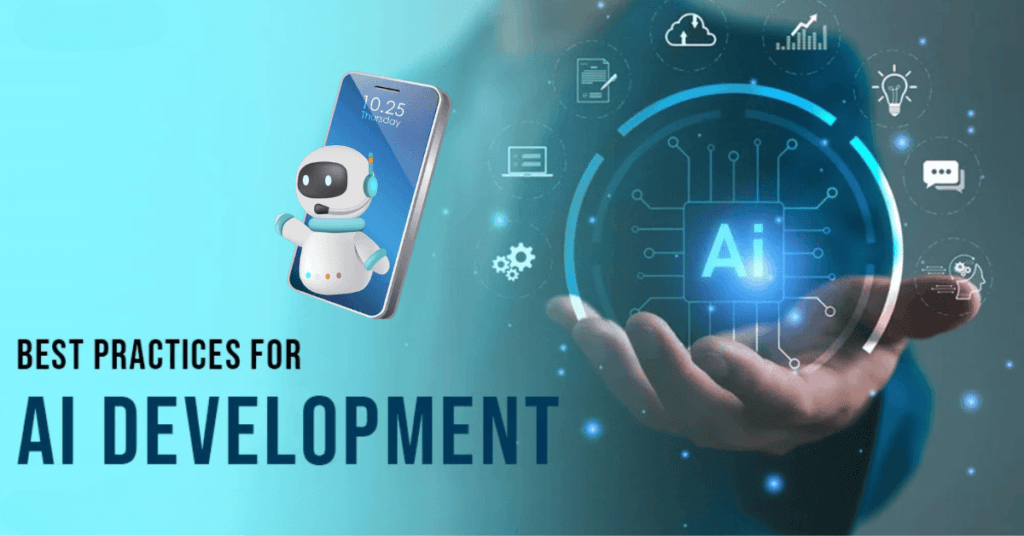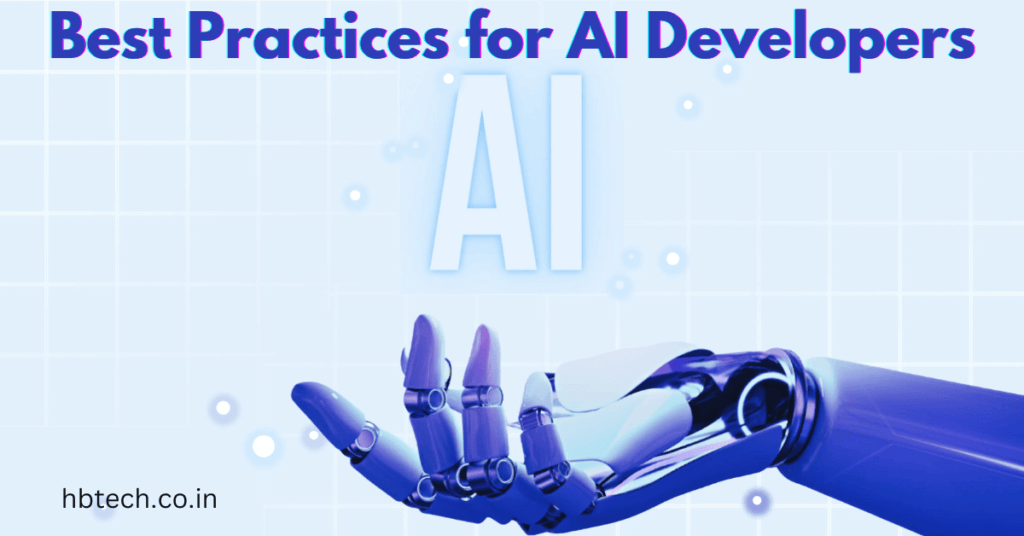Artificial Intelligence (AI) is transforming industries worldwide and as a developer, mastering AI involves more than just coding. It’s about following effective practices to build ethical, scalable and impactful solutions.
Best Practices for AI Development

Creating AI systems involves various stages, from collecting data to deploying models. Here are some essential tips:
- Understand the Problem : Before starting, make sure you fully grasp the issue you’re trying to solve. Not all problems require AI, so set clear goals.
- Focus on Data Quality : The success of AI depends on high-quality data. Spend time cleaning and organizing your data to improve your results.
- Ensure Ethics and Fairness : AI systems must be unbiased and transparent. Regularly check for biases and follow ethical guidelines.
- Build in Steps : Develop your models gradually and use version control to keep track of progress and changes.
- Make Models Easy to Explain : Especially in sensitive areas like healthcare or finance, ensure your models are understandable to users.
Tips for AI Developers in India
India is becoming a hub for AI innovation. Here are some practices tailored for Indian developers:
- Use Free Tools : Open-source libraries like TensorFlow, PyTorch, and scikit-learn are great for building AI solutions without spending much.
- Stay Updated : Follow AI research, attend events and join local communities like AI India and DataHack to stay ahead.
- Solve Local Problems : Focus on areas unique to India, such as multilingual applications, agriculture or affordable healthcare.
- Learn Continuously : Take online courses and get certifications from platforms like Coursera, Udemy or edX to keep improving.
Best AI Tools for Developers
Developers often use pre-built AI platforms to save time and effort. Some of the top options are:
- Google Cloud AI : Offers pre-trained models and tools to build custom solutions.
- AWS AI Services : Provides APIs for tasks like image recognition and language processing.
- Microsoft Azure AI : Combines cloud computing with AI tools.
- Hugging Face : Ideal for building natural language processing (NLP) applications.
- OpenAI Models : Useful for generating text and conversational AI systems.
Tips for API Design
APIs play a big role in connecting AI systems with other tools. Follow these practices for better API design:
- Keep It Simple : Ensure your APIs are easy to understand, with clear instructions.
- Use Versions : Introduce versioning to avoid breaking changes in updates.
- Focus on Security : Use strong authentication and encryption to protect data.
- Plan for Growth : Design APIs to handle increasing demand as your solution grows.
Best Programming Languages for AI
Choosing the right programming language can make AI development easier. Here are some popular choices:
- Python : Easy to learn and supported by a wide range of AI libraries.
- R : Great for data analysis and visualization.
- Java : Often used in large-scale enterprise applications.
- Julia : Known for its speed in numerical computing.
Automating Quality Checks in AI (QAPI)
Automation is key to ensuring your AI systems work efficiently. Here are some tips:
- Test Early: Test your models at every stage of development.
- Use Automation Tools: Tools like Selenium or Postman can help with testing and monitoring.
- Track Performance: Keep an eye on accuracy, speed, and resource use to improve your system.
Best Software for AI Development
Using the right software makes AI development smoother. Here are some top picks:
- Jupyter Notebook : Ideal for writing and testing code interactively.
- MATLAB : Useful for mathematical modeling and simulations.
- RapidMiner : Simplifies machine learning workflows.
- KNIME : Great for data integration and analytics.
Best Practices for Building APIs
When developing APIs for AI, follow these practices:
- Be Clear : Each API endpoint should serve a specific function.
- Set Limits : Use rate limiting to prevent overuse or abuse of your APIs.
- Handle Errors Well : Provide helpful error messages to make debugging easier.
- Follow Standards : Use RESTful principles like standard HTTP methods (GET, POST, etc.).
Tips for Writing AI Code
To write better AI programs, keep these tips in mind:
- Break It Down : Write small, reusable pieces of code.
- Work Collaboratively : Use agile methods to get feedback and improve quickly.
- Optimize Your Code : Focus on making it fast and accurate.
- Document Everything : Keep clear records of how your code works for future reference.
By following these simple yet effective practices, you can create AI solutions that are reliable, ethical and impactful. Whether you’re just starting or already experienced, these tips will help you excel in AI development.
Frequently Asked Questions(FAQs)
What are the key practices for successful AI development?
Successful AI development requires understanding the problem, using high-quality data, ensuring ethical and fair models, iterative model building with version control, and making models explainable to end users.
What tools are recommended for AI developers?
Some of the best tools for AI developers include TensorFlow, PyTorch, Google Cloud AI, AWS AI Services, Microsoft Azure AI and Jupyter Notebook for interactive coding.
Which programming languages are best for AI development?
Python is the most popular due to its simplicity and extensive libraries. Other good options include R for data analysis, Java for enterprise applications and Julia for numerical computing.
How can API design support AI systems?
To ensure efficient API integration, keep APIs simple, use version control, prioritize security with authentication and encryption and design for scalability to handle increased demand.
What practices can help Indian developers excel in AI?
Indian developers should focus on solving local challenges, leverage free and open-source tools, stay updated with industry trends and continuously upskill with certifications and online courses.
Related Posts
- How to do Paytm Full KYC || From your mobile at home
- What’s app Privacy Policy : What’s App got angry || See what What’s App said…
- WhatsApp Banking : How to Check Bank Balance Through WhatsApp
- How Many SIM Cards are Activate with my Aadhar
- Exploring the World of ChatGPT: A Comprehensive Guide
- Canva: Your One-Stop Shop for All Things Design









